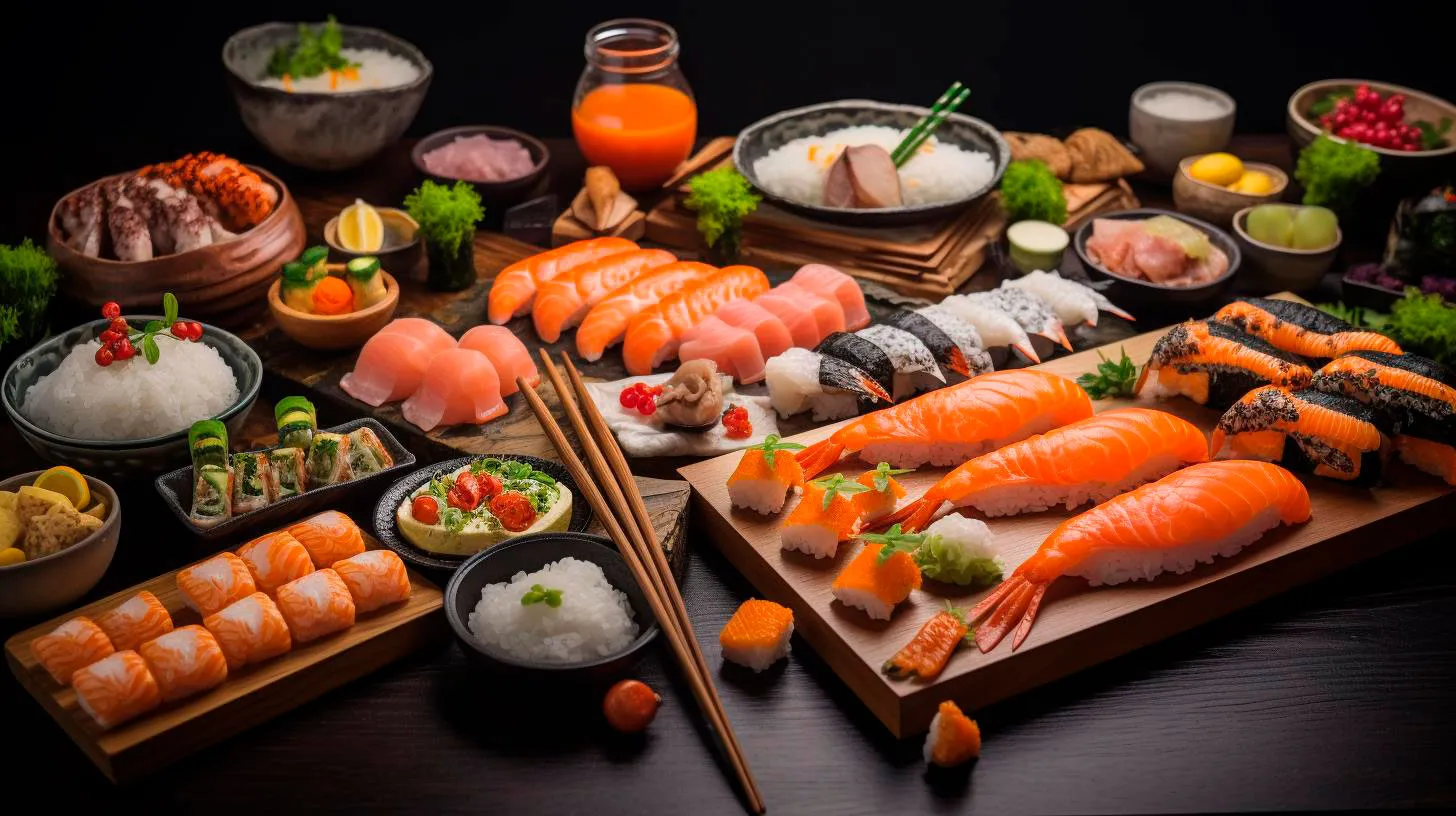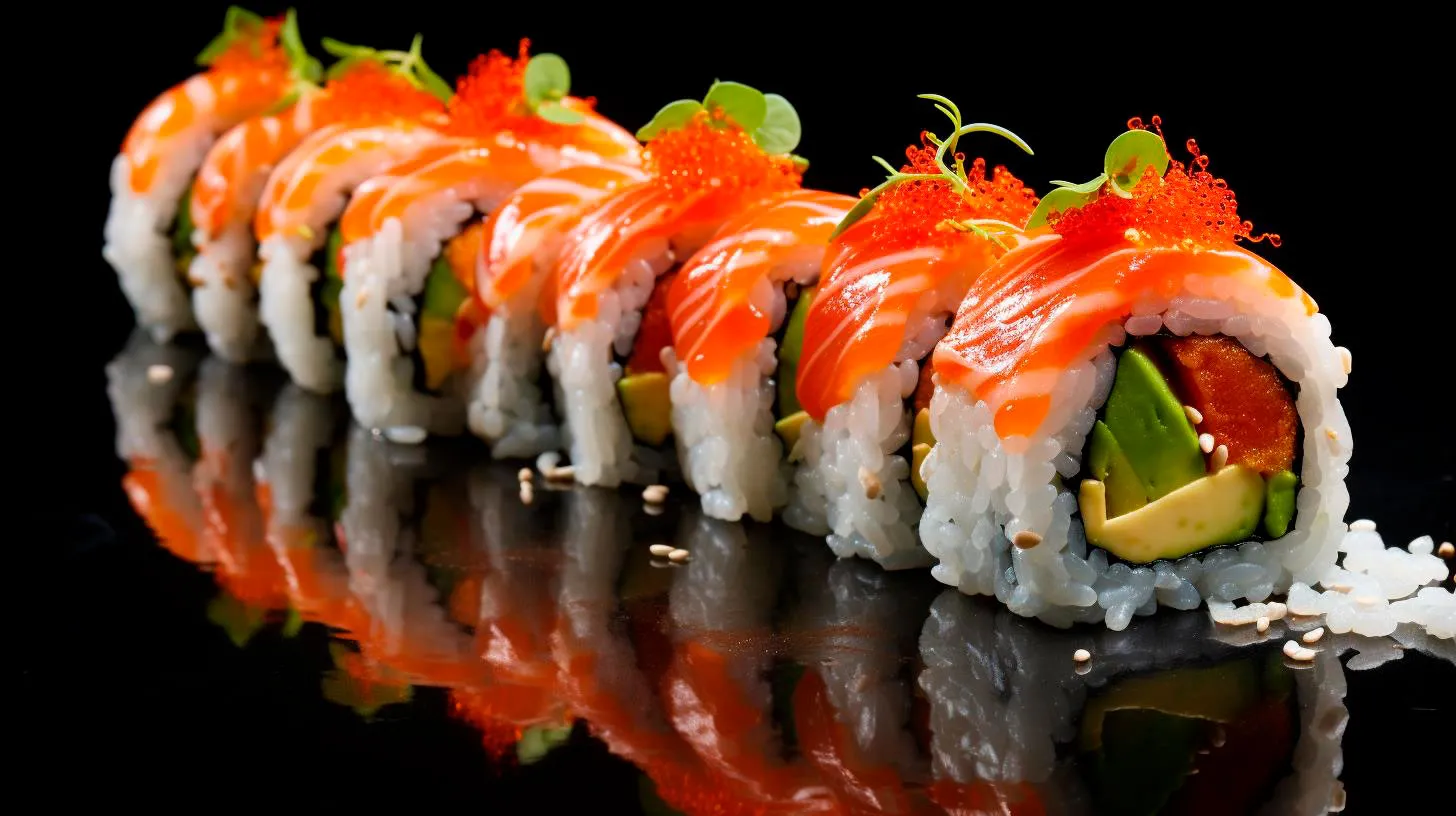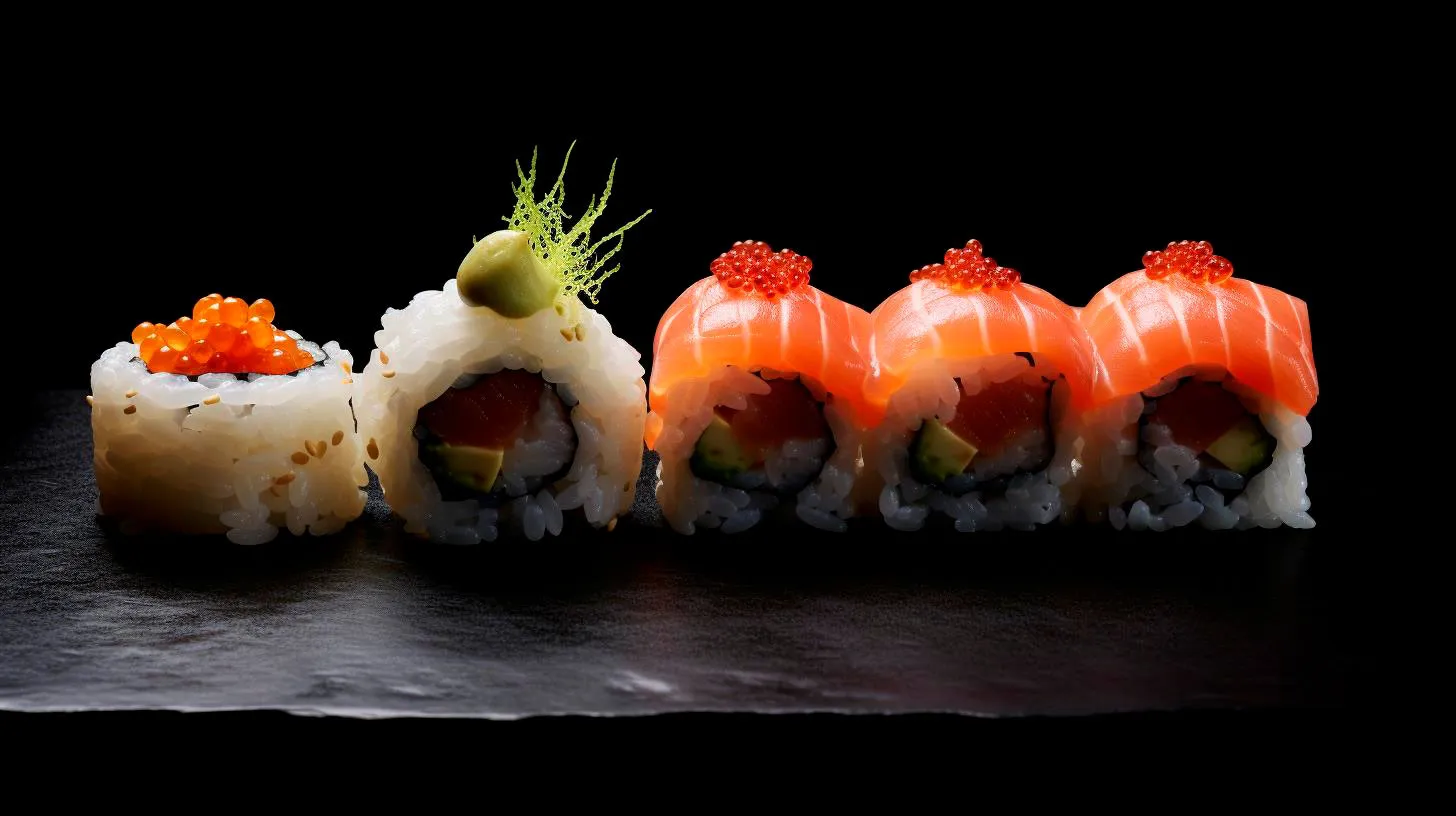The Sushi Chef Journey of Self-Discovery
In this article, we’ll explore the remarkable journey of a sushi chef – the rigorous training, the mastery of skills, and the deep connection to the culinary world that goes beyond the exquisite dish itself.
The Art of Sushi Making
Sushi, a traditional Japanese cuisine, has gained immense popularity worldwide. However, the art of sushi making is a meticulous craft that requires years of training and experience. From selecting the freshest ingredients to mastering the art of rice preparation and knife techniques, sushi chefs dedicate themselves to perfecting every aspect of this culinary art.
During their training, aspiring sushi chefs spend countless hours under the guidance of a master chef, honing their skills and developing an acute sense of taste and presentation. They learn the traditional techniques that have been passed down through generations while embracing innovation and creativity to create their own signature style.
The Path to Mastery
Becoming a sushi chef is no ordinary endeavor – it is a journey that demands commitment, resilience, and a profound love for the craft. Let’s explore the key milestones in a sushi chef’s journey:
- Apprenticeship: An aspiring sushi chef typically begins their journey as an apprentice, known as an itamae. During this phase, they observe and learn from experienced chefs, gradually transitioning from mundane tasks to more intricate ones.
- Rice Mastery: The art of sushi making begins with the rice. A sushi chef must master the technique of cooking the rice to the perfect consistency and flavor, as it serves as the base for every piece of sushi.
- Knife Skills: The precision and finesse required in sushi preparation demand exceptional knife skills. From filleting fish with surgical precision to slicing vegetables into beautiful garnishes, the mastery of knife techniques is an essential aspect of a sushi chef’s training.
- Ingredient Selection: Choosing the finest, freshest ingredients is crucial in sushi making. Sushi chefs develop an extraordinary understanding of seafood, ensuring that each piece is of the highest quality and passes their discerning standards.
- Creativity and Innovation: While tradition plays a vital role in sushi making, sushi chefs also strive to bring their own unique touch to the art. They experiment with flavors, textures, and presentation techniques, continuously pushing the boundaries of this ancient craft.
The Journey of Self-Discovery
Beyond the culinary mastery, the journey of a sushi chef is one of personal growth and self-discovery. The pursuit of excellence in their craft often leads them to uncover valuable life lessons:
- Discipline: Through years of training and the demanding nature of the profession, sushi chefs develop discipline that transcends the kitchen. This discipline instills a strong work ethic, attention to detail, and a commitment to constant improvement.
- Persistence: Overcoming challenges and setbacks is an integral part of the sushi chef’s journey. Whether it’s perfecting a difficult technique or adapting to the ever-changing culinary landscape, persistence becomes second nature, enabling them to thrive in the face of adversity.
- Balance: Sushi making is an art form that relies on the delicate balance of flavors, textures, and visual aesthetics. Sushi chefs learn to embrace balance not only in their culinary creations but also in their personal lives, finding harmony between their passion and other aspects of life.
- Connection: A sushi chef’s connection to their ingredients, their culture, and their customers is profound. They strive to create an experience that goes beyond a mere meal, aiming to evoke emotions and forge a deep connection with those who savor their creations.
The Takeaway
The journey of a sushi chef embodies a true quest for excellence, encapsulating the multidimensional nature of culinary artistry. From the meticulous preparation techniques to the personal growth experienced along the way, the path of the sushi chef is a profound exploration of self-discovery.
So, the next time you indulge in a perfectly crafted piece of sushi, take a moment to appreciate the incredible journey that led to its creation. Each bite tells a story of dedication, passion, and the ever-evolving exploration of the sushi chef’s self.
Sushi and Spirituality: Finding Inner Peace through Culinary Mastery
In this article, we will explore the fascinating connection between sushi and spirituality, and how mastering the art of sushi-making can lead to a profound sense of tranquility.
The Zen of Sushi
Sushi is not merely a meal; it is an art form influenced by Zen Buddhism. This ancient Japanese philosophy emphasizes mindfulness, meditation, and being fully present in the moment. Similarly, sushi-making requires absolute focus, attention to detail, and a deep understanding of the ingredients. When preparing sushi, the chef becomes one with the ingredients, creating a harmonious blend of flavors and textures. This process mirrors the state of mindfulness and flow, allowing for inner clarity and peace to emerge.
Key Takeaway: Mastering the art of sushi-making requires mindfulness, attention to detail, and being fully present in the moment.
The Ritual of Sushi
Sushi-making is not just about the final product; it is a ritualistic practice that promotes a sense of inner calm. From carefully selecting the freshest ingredients to skillfully slicing and arranging them with precision, every step in the sushi-making process is imbued with intention and reverence. This ritualistic approach to sushi creation not only enhances the taste but also creates a meditative experience for both the chef and the consumer. Taking part in this sacred ritual can provide a profound sense of tranquility and connection to a higher power.
Key Takeaway: The ritualistic nature of sushi-making promotes a sense of inner calm and connection to a higher power.
Mindful Eating: A Spiritual Experience
When indulging in a plate of sushi, there is an opportunity to practice mindful eating, an essential part of spiritual growth. Mindful eating involves savoring each bite, paying attention to the flavors and textures, and being fully present with the food. By consciously engaging with the sushi in front of us, we can cultivate gratitude, appreciation, and a deeper connection with our bodies. This heightened awareness allows us to tap into the present moment, leading to a more profound sense of satisfaction and contentment.
Key Takeaway: Mindful eating during sushi consumption cultivates gratitude, appreciation, and a deeper connection with our bodies.
The Health Benefits of Sushi
In addition to its spiritual aspects, sushi offers numerous health benefits that contribute to overall well-being. The primary ingredients in sushi such as fresh fish, seaweed, and vegetables are rich in omega-3 fatty acids, vitamins, and minerals. These nutrients support brain function, cardiovascular health, and boost the immune system. With its low-calorie and high-protein profile, sushi can also aid in weight management and promote a healthy lifestyle.
Key Takeaway: Sushi is not only spiritually enriching, but it also provides essential nutrients and promotes overall health and well-being.
Incorporating Sushi into Your Spiritual Practice
If you are inspired to infuse sushi into your spiritual practice, here are some tips to get started:
- Attend a sushi-making workshop or class to learn the fundamentals of this art form.
- Practice mindfulness and presence while preparing and consuming sushi.
- Experiment with different flavors and ingredients to create a personalized sushi experience.
- Share your sushi creations with friends and family to spread the joy and serenity.
- Explore the history and cultural significance of sushi to deepen your appreciation for the craft.
The journey of sushi and spirituality is a profound one. By embracing the art of sushi-making and indulging in its flavors mindfully, we can tap into a state of inner peace and harmony. Incorporating sushi into our spiritual practice allows us to find tranquility, practice mindfulness, and cultivate a deeper connection with ourselves and the world around us.
So, why wait? Grab your bamboo mat, sharpen your knife, and embark on a culinary adventure that will not only tantalize your taste buds but also nourish your soul.
Zen and the Art of Sushi
So, let’s grab our chopsticks and embark on this culinary journey!
The Origins of Sushi
Sushi, as we know it today, has been around for centuries. It originated in Southeast Asia as a way to preserve fish by fermenting it with rice and salt. This fermented fish was then discarded, and only the rice was consumed. Over time, this method evolved, and the fermentation process was replaced by vinegar, resulting in the sushi we enjoy today.
However, the true origins of sushi can be traced back to the Buddhist monasteries in ancient Japan. The monks used to ferment fish and wrap it in rice to allow it to last longer. This technique not only preserved the fish but also added a unique tangy flavor. The monasteries were an essential part of the Zen Buddhist tradition, and their influence can be seen in the philosophy behind sushi.
The Zen Philosophy in Sushi Making
Zen Buddhism emphasizes mindfulness, simplicity, and the appreciation of the present moment. These principles are reflected in the art of sushi making. From selecting the freshest ingredients to carefully slicing the fish and expertly rolling it, every step in the sushi-making process requires utmost precision and attention to detail.
Sushi chefs, known as Itamae, undergo years of training to master their craft. They develop a deep understanding of the ingredients, the art of knife skills, and the balance of flavors. The focus and concentration required mirror the meditative state that Zen practitioners strive to achieve. The result is a culinary masterpiece that not only delights the taste buds but also calms the mind.
The Zen of Eating Sushi
The Zen philosophy extends beyond the preparation of sushi and into its consumption. When enjoying sushi, it is important to be fully present and appreciative of each bite. Slowly savoring the flavors, noticing the textures, and relishing the subtle nuances of each ingredient helps create a meditative experience.
Furthermore, sushi is often enjoyed in serene and minimalist settings, echoing the tranquility and simplicity of Zen gardens. The clean lines, natural materials, and carefully designed spaces create an ambiance that enhances the overall dining experience. This attention to detail cultivates a sense of calm and allows one to focus on the sushi itself.
The Health Benefits of Sushi
In addition to its philosophical underpinnings, sushi offers numerous health benefits. Traditional sushi is primarily made with raw fish, which is an excellent source of lean protein, omega-3 fatty acids, and essential minerals such as iodine and selenium. These nutrients have been linked to improved heart health, brain function, and overall well-being.
Moreover, sushi often incorporates seaweed, which is rich in vitamins A and C, iodine, and antioxidants. Seaweed has been found to support thyroid function, boost the immune system, and promote healthy skin. The combination of fish, rice, and seaweed makes sushi a nutritious meal choice, provided it is prepared with fresh and high-quality ingredients.
Key Takeaways
- Sushi is an art form rooted in Zen Buddhism, emphasizing mindfulness and simplicity.
- The origins of sushi can be traced back to Buddhist monasteries in ancient Japan.
- Sushi chefs undergo extensive training to master their craft, reflecting Zen principles of focus and attention to detail.
- Eating sushi can be a meditative experience when approached with mindfulness.
- Sushi offers numerous health benefits due to its high-quality ingredients, including lean protein and essential nutrients.
In conclusion, sushi is not just a dish to satisfy hunger but a profound experience that connects us to the ancient wisdom of Zen. Whether you are a sushi aficionado or a curious beginner, let the artistry, mindfulness, and health benefits of sushi inspire you to explore this extraordinary culinary tradition. Remember to slow down, savor each bite, and embrace the Zen philosophy that lies within every roll of sushi.
Unveiling the Secrets: A Sushi Chef’s Path to Enlightenment
In this blog post, we will uncover the secrets of a sushi chef’s path to enlightenment.
1. The Art of Sushi Making
Sushi-making is a delicate art that requires years of practice to master. A sushi chef, also known as an Itamae, has to go through rigorous training to perfect their skills. They learn the traditional techniques of sushi making, such as preparing sushi rice, knife skills for precise cuts, and how to select the freshest ingredients. The attention to detail is crucial to create visually stunning and flavorsome sushi rolls.
Key takeaway: The art of sushi-making is a long and meticulous process that requires years of training and practice.
2. The Importance of Fresh Ingredients
One of the core principles of sushi-making is the use of fresh and high-quality ingredients. Sushi chefs prioritize sourcing the finest seafood and other ingredients to ensure the best taste and texture. They understand the importance of sustainable fishing practices and work closely with suppliers to obtain the freshest catches. The quality and freshness of the ingredients significantly impact the overall sushi experience.
Key takeaway: Sushi chefs always prioritize freshness and quality when selecting their ingredients, contributing to the exceptional taste of sushi.
3. The Role of Knife Skills
Knife skills are paramount for a sushi chef. They spend years honing their ability to handle knives with precision and finesse. The knife used, known as a Yanagi, has a single-edged blade, allowing the chef to make exceptionally thin and clean cuts. The mastery of knife skills ensures that each slice of fish is cut to the right thickness, enhancing both the visual appeal and taste of the sushi.
Key takeaway: A sushi chef’s knife skills play a vital role in creating beautifully presented and delicious sushi.
4. The Zen Philosophy Behind Sushi
There is a deep spiritual aspect intertwined with the art of making sushi. Sushi chefs embrace the Zen philosophy, which values simplicity, mindfulness, and respect for the ingredients. The creation of sushi becomes a meditative experience, where the chef channels their inner focus and connects with each step of the process. It is this mindset that elevates sushi-making to a form of enlightenment.
Key takeaway: The Zen philosophy is an integral part of sushi-making, creating a sense of harmony between the chef, the ingredients, and the final creation.
5. The Sushi Chef’s Journey
Becoming a sushi chef is a lifelong journey of continuous learning and improvement. Even after years of experience, sushi chefs seek new inspirations, explore innovative techniques, and experiment with different flavor combinations. This commitment to growth and mastery allows them to push the boundaries of traditional sushi and create unique culinary experiences.
Key takeaway: The journey of a sushi chef is a constant pursuit of excellence, where they are always striving to enhance their skills and create new culinary delights.
The Perfect Balance: Skill, Craftsmanship, and Enlightenment
Sushi is not just food; it is a form of art that reflects the harmony between nature, craftsmanship, and culinary expertise. The secrets behind a sushi chef’s path to enlightenment lie in their dedication to the craft, unwavering attention to detail, and the ability to connect with their ingredients on a spiritual level. The next time you enjoy a plate of sushi, savor the flavors and appreciate the incredible journey it took to create that masterpiece.



